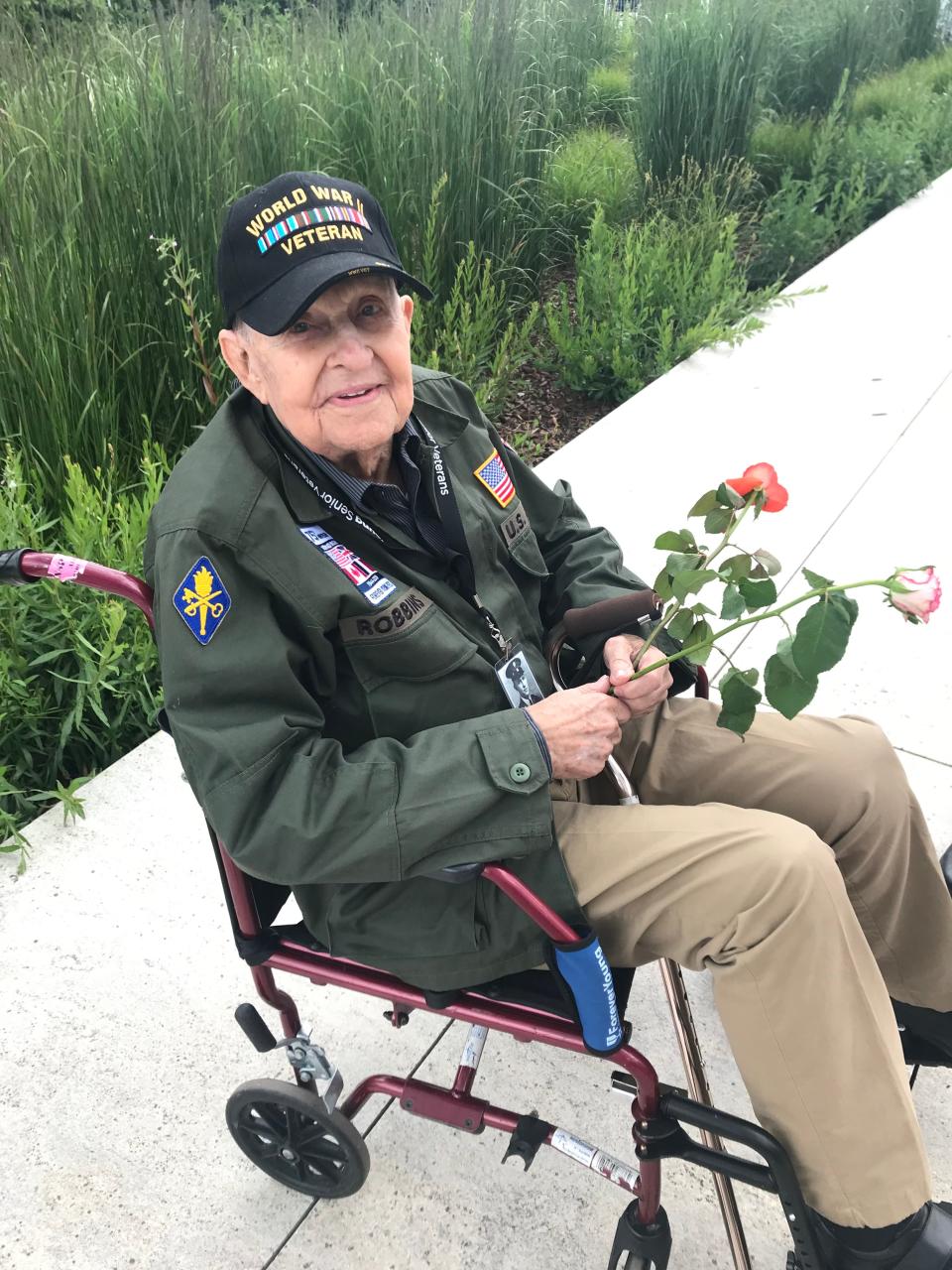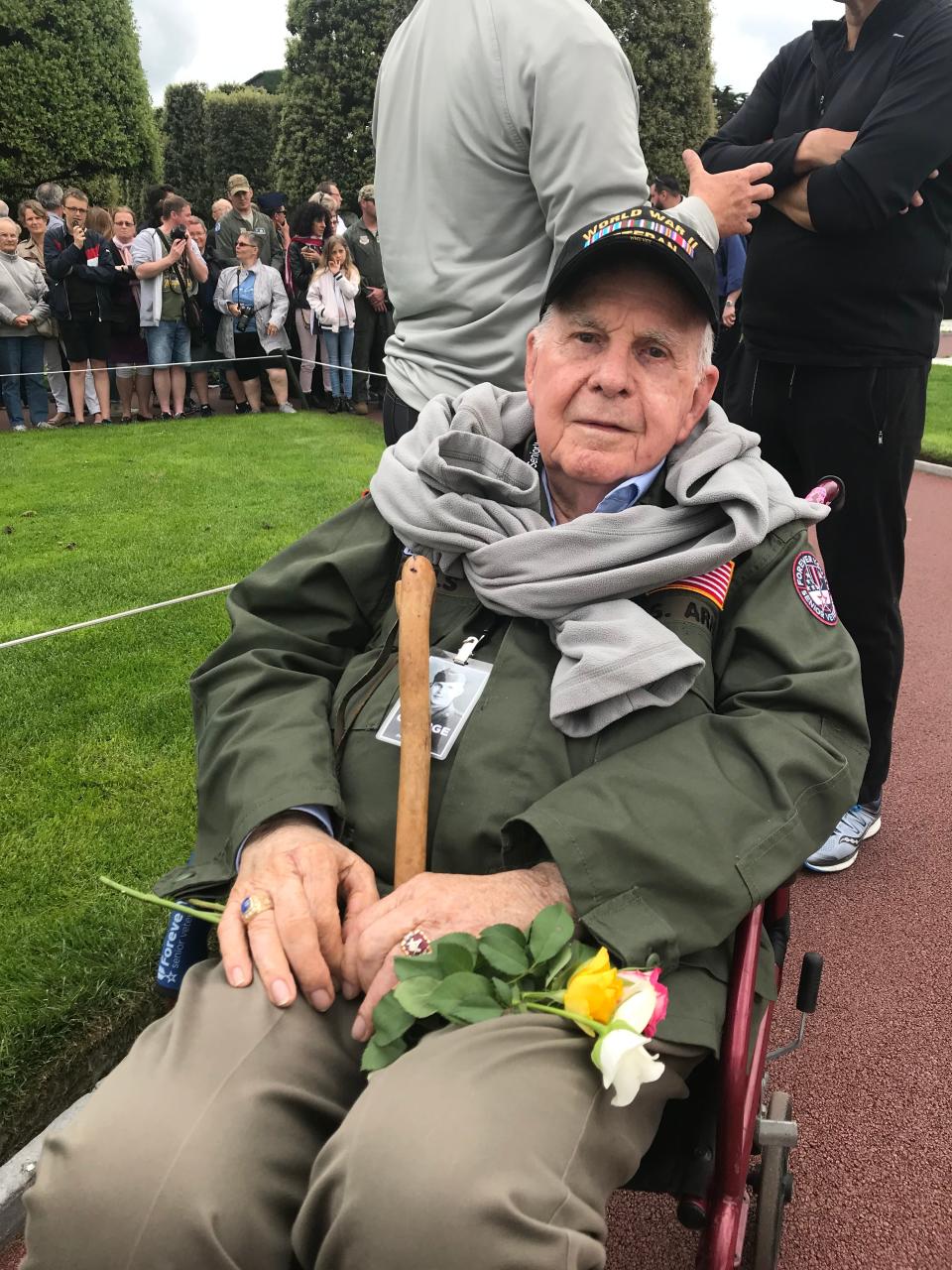'We changed the world': Now in their 90s, WWII veterans gather in Normandy for D-Day anniversary
COLLEVILLE-SUR-MER, France – K.T. Robbins remembers the water rising over the floorboards as his truck pulled off the ship and onto Utah Beach – the first moment of uncertainty in what would turn out to be months of chaos as he made his way into Normandy.
Robbins served in a bakery battalion, supplying troops with fresh bread – 3,000 pounds of it every day. As they came ashore, their trucks were laden with massive ovens, generators and fuel. They carried tents but didn’t dare put them up. Tents were too easy a target for German strafing.
“We lost a lot of people, but it had to be done,” said Robbins, a Mississippi man visiting Normandy this week for the 75th anniversary of D-Day. “You might say we changed the world.”
Asked why, at 97, he was making his first return to Normandy since the war, Robbins laughed.
“I had to work all my life, man,” he said.
Trump's D-Day speech: What to expect
UK ceremony: Trump reads FDR's D-Day prayer, joins Queen Elizabeth, other leaders
When President Donald Trump stood with other global leaders and delivered remarks here Thursday, he followed a decades-long tradition of American presidents honoring the troops who stormed ashore in France and changed the course of World War II. And he's almost certainly one of the last presidents to address living U.S. veterans of D-Day at the site of their heroism.

Fading fast
An 18-year-old serving on D-Day would be 93 this year. The Department of Veterans Affairs estimates that just under 500,000 U.S. World War II veterans were still living in late 2018. By 2024, when the 80th anniversary of D-Day will take place in France, the agency projects just more than 87,000 World War II veterans will still be alive.
There were few politicians wandering the edge of Omaha Beach on the day before the ceremony, and so the veterans didn’t have to share the spotlight. As crews readied the stage and buses of tour groups arrived at the Normandy American Cemetery and Memorial, throngs of tourists encircled the veterans, many of whom were getting around in wheelchairs. School groups peppered them with questions. Waves of strangers approached the veterans to shake hands, offer thanks and snap a photograph.
Most of the men were not interested in talking about Trump, who will take the stage here during a trip to Europe that has included ceremonies on the south coast of Britain as well a formal state visit with Queen Elizabeth II.
“He says a lot of crazy things I don’t like. He’s got a big mouth,” Robbins said. “But as far as presidents go, he’s all right.”
Reunited: They were 19 when they died on D-Day. 75 years later, twins are reunited at Normandy cemetery
‘When the fright sets in’

George Mills arrived on Omaha Beach a few weeks after D-Day and went on to fight in several major battles, including the Battle of the Bulge. The Alabama man, now 98, was captured, became a prisoner of war and was forced by the Germans to march for months across Europe.
“It was a sobering day,” Mills said, remembering his landing. “When that ramp falls, you’ve been trained to scatter as quickly as you can."
“That’s when the fright sets in,” he said.
Sitting in a wheelchair near where world leaders will speak on Thursday, Mills mostly skirted questions about Trump’s presidency. As military planes – both modern and World War II-era – flew overhead, Mills sat under a U.S. flag that was lowered as a bugle call fell over a growing group of onlookers.
Mills said he is concerned the youngest generation may not learn from what anchorman Tom Brokaw dubbed the Greatest Generation.
“All these young children, one of these days are going to have to fight a war,” Mills predicted. “And they need to really know what happened in World War II, because it’s going to face them someday.”
Dramatic changes since D-Day: Before-and-after photos

‘Shooting…is not loving’
Buck Price was helmsman of one of the landing ships that ferried supplies ashore to Omaha Beach on D-Day.
The 93-year-old Price, sitting Wednesday near the cliffs that made Omaha an especially challenging mission, paused repeatedly as he recalled some of his more harrowing encounters.
Price, of Tarboro, North Carolina, once watched as the second of three ships attempting a beach landing “blew all to hell.”
His was the third ship to land. Initially, the skipper tried to pull out to find a better spot, but he was ordered back in.
Later, Price remembered being on the beach when a German bomber came in so low and so close that the pilot waved to him and his men. They waved back.
“We just stood there,” Price said, laughing now. “We couldn’t run.”
The pilot dropped two bombs over a ship, Price said. Both missed.
Asked what lesson he thought the world should learn from his experience on D-Day, Price didn’t pause.
“Love thy fellow man,” he said. “Shooting at him is not loving him.”
Five things to know: The 75th anniversary of the WWII Normandy landings
Contributing: Michael Collins
This article originally appeared on USA TODAY: 'We changed the world': Now in their 90s, WWII veterans gather in Normandy for D-Day anniversary

